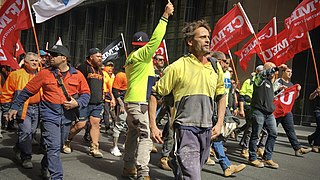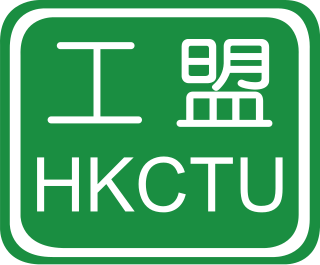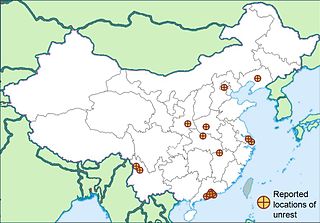A trade union, often simply referred to as a union, is an organization of workers intent on "maintaining or improving the conditions of their employment", such as attaining better wages and benefits, improving working conditions, improving safety standards, establishing complaint procedures, developing rules governing status of employees and protecting and increasing the bargaining power of workers.
Labour laws are those that mediate the relationship between workers, employing entities, trade unions, and the government. Collective labour law relates to the tripartite relationship between employee, employer, and union.

A sweatshop or sweat factory is a crowded workplace with very poor, socially unacceptable or illegal working conditions. Some illegal working conditions include poor ventilation, little to no breaks, inadequate work space, insufficient lighting, or uncomfortably/dangerously high or low temperatures. The work may be difficult, tiresome, dangerous, climatically challenging or underpaid. Workers in sweatshops may work long hours with unfair wages, regardless of laws mandating overtime pay or a minimum wage; child labor laws may also be violated. Women make up 85 to 90% of sweatshop workers and may be forced by employers to take birth control and routine pregnancy tests to avoid supporting maternity leave or providing health benefits. The Fair Labor Association's "2006 Annual Public Report" inspected factories for FLA compliance in 18 countries including Bangladesh, El Salvador, Colombia, Guatemala, Malaysia, Thailand, Tunisia, Turkey, China, India, Vietnam, Honduras, Indonesia, Brazil, Mexico, and the US. The U.S. Department of Labor's "2015 Findings on the Worst Forms of Child Labor" found that "18 countries did not meet the International Labour Organization's recommendation for an adequate number of inspectors."

Strike action, also called labor strike, labour strike, or simply strike, is a work stoppage caused by the mass refusal of employees to work. A strike usually takes place in response to employee grievances. Strikes became common during the Industrial Revolution, when mass labor became important in factories and mines. As striking became a more common practice, governments were often pushed to act. When government intervention occurred, it was rarely neutral or amicable. Early strikes were often deemed unlawful conspiracies or anti-competitive cartel action and many were subject to massive legal repression by state police, federal military power, and federal courts. Many Western nations legalized striking under certain conditions in the late 19th and early 20th centuries.
Collective bargaining is a process of negotiation between employers and a group of employees aimed at agreements to regulate working salaries, working conditions, benefits, and other aspects of workers' compensation and rights for workers. The interests of the employees are commonly presented by representatives of a trade union to which the employees belong. The collective agreements reached by these negotiations usually set out wage scales, working hours, training, health and safety, overtime, grievance mechanisms, and rights to participate in workplace or company affairs.

The Union of Shop, Distributive and Allied Workers (Usdaw) is a trade union in the United Kingdom, consisting of around 360,000 members. Usdaw members work in a variety of occupations and industries including: shopworkers, factory and warehouse workers, drivers, call centres, clerical workers, milkround and dairy process, butchers and meat packers, catering, laundries, chemical processing, home shopping and pharmaceutical. The retail sector employs around 2.77 million people.

The Hong Kong Confederation of Trade Unions (HKCTU) was a pro-democracy labour and political group in the Hong Kong. It was established on 29 July 1990. It had 160,000 members in 61 affiliates and representation in the Legislative Council of Hong Kong (LegCo) to challenge government policies and push for legal protection of worker and trade union rights. It was one of the two most influential labour groups in Hong Kong, with the other one being the pro-Beijing Hong Kong Federation of Trade Unions.
China Labor Watch (CLW) is a New York City, New York-based non-government organization founded by labor activist Li Qiang in October 2000. Its mission is the defense of workers' rights in China. Through research, advocacy and legal assistance, CLW seeks to help China's workers become more informed of their rights and more empowered to realize those rights within their communities.

Yue Yuen Industrial (Holdings) Limited is a Taiwanese footwear manufacturer headquartered in Hong Kong and established by its Taiwanese parent company, Pou Chen Group. It is the largest branded athletic and casual footwear manufacturer in the world. It is an original equipment manufacturer (OEM) and original design manufacturer (ODM) for major international brand name companies such as Nike, Crocs, Adidas, Reebok, Asics, New Balance, Puma, Timberland and Rockport.

Indian labour law refers to law regulating labour in India. Traditionally, the Indian government at the federal and state levels has sought to ensure a high degree of protection for workers, but in practice, this differs due to the form of government and because labour is a subject in the concurrent list of the Indian Constitution. The Minimum Wages Act 1948 requires companies to pay the minimum wage set by the government alongside limiting working weeks to 40 hours. Overtime is strongly discouraged with the premium on overtime being 100% of the total wage. The Payment of Wages Act 1936 mandates the payment of wages on time on the last working day of every month via bank transfer or postal service. The Factories Act 1948 and the Shops and Establishment Act 1960 mandate 15 working days of fully paid vacation leave each year to each employee with an additional 7 fully paid sick days. The Maternity Benefit (Amendment) Act, 2017 gives female employees of every company the right to take 6 months' worth of fully paid maternity leave. It also provides for 6 weeks worth of paid leaves in case of miscarriage or medical termination of pregnancy. The Employees' Provident Fund Organisation and the Employees' State Insurance, governed by statutory acts provide workers with necessary social security for retirement benefits and medical and unemployment benefits respectively. Workers entitled to be covered under the Employees' State Insurance are also entitled to 90 days worth of paid medical leaves. A contract of employment can always provide for more rights than the statutory minimum set rights. The Indian parliament passed four labour codes in the 2019 and 2020 sessions. These four codes will consolidate 44 existing labour laws. They are: The Industrial Relations Code 2020, The Code on Social Security 2020, The Occupational Safety, Health and Working Conditions Code, 2020 and The Code on Wages 2019.
European labour law regulates basic transnational standards of employment and partnership at work in the European Union and countries adhering to the European Convention on Human Rights. In setting regulatory floors to competition for job-creating investment within the Union, and in promoting a degree of employee consultation in the workplace, European labour law is viewed as a pillar of the "European social model". Despite wide variation in employment protection and related welfare provision between member states, a contrast is typically drawn with conditions in the United States.
Nike, Inc. has been accused of using sweatshops and worker abuse to produce footwear and apparel in East Asia.

As the economy of China has rapidly developed, issues of labor relations have evolved. Prior to this reform, Chinese citizens were only allowed to work where they originated from. Since 1978 when China began labor force reforms the overwhelming majority of the labor force were either working at State owned enterprises or as farm workers in the rural countryside. However, over time China began to reform and by the late 90's many had moved from the countryside into the cities in hopes of higher paying jobs and more opportunities. The only connection between the countryside and the city soon became that there was a huge floating population connecting them. Independent unions are illegal in China with only the All-China Federation of Trade Unions permitted to operate. China has been the largest exporter of goods in the world since 2009. Not only that, in 2013 China became the largest trading nation in the world. As China moved away from their planned economy and more towards a market economy the government has brought on many reforms. The aim of this shift in economies was to match the international standards set by the World Trade Organization and other economic entities. The All-China Federation of Trade Unions (ACTFU) that was established to protect the interests of national and local trade unions failed to represent the workers, but instead failed to do so leading to the 2010 crackdowns. However these strikes were centered around foreign companies.

The 2010 Chinese labour unrest was a series of labour disputes, strike actions, and protests in the south of the People's Republic of China that saw striking workers successfully receive higher pay packages.
The National Trades Union Congress (NTUC) spearheads the labour movement of Singapore, which represents almost a million workers in the country across more than 70 unions, affiliated associations and related organisations. Singapore runs on a tripartism model which aims to offers competitive advantages for the country by promoting economic competitiveness, harmonious government-labour-management relations and the overall progress of the nation.
On February 14, 2011, In Kigali, Rwanda more than 500 workers at the UTEXRWA textile factory began a six-day long strike in protest of unfair working conditions that started when new management came into power. The strikers were protesting low wages of Rwandan Franc RWF15,800 (US$27) a month, lack of annual leave, non-paid overtime, and poor working and health conditions. The strikers were also protesting for thirty-three employees that were previously let go with little explanation. The strike was an act of nonviolence but it could also be looked at under the paradox of repression. The act of paradox repression is used by the opponents of nonviolent activist to deter them from gaining momentum in their campaign. Paradox repression can happen in the form of firing employees or banning individuals from places, or it can happen in the form of arrests or violence. When manager, Trivets Deepak of UTEXRWA, let the thirty-three workers go it was an act of paradox repression in an attempt to further silence complaints.
The Jasic incident was a labour dispute in Pingshan District, Shenzhen of the Guangdong province of the People's Republic of China between labour organizers and Chinese authorities that lasted from July to August 2018.
IBM worker organizations have not historically been recognized by IBM. Since the company's foundation in 1911, it has not recognized any trade unions in the United States, despite the efforts by workers to establish them from 1970 onwards. In Europe and Australia there are several trade unions recognized by IBM, with limited recognition.

Workers of the German auto manufacturer Volkswagen Group are collectively organized and represented across a variety of worker organizations including trade unions and Works Councils across the globe. Workers are organized on multiple levels; locally, regionally, nationally, internationally and by marque.








